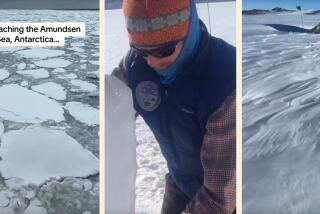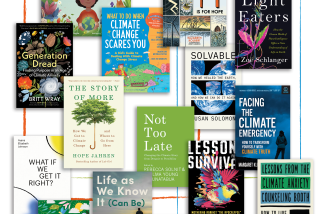Focus : Pushing the Ozone Envelope : CBS DRAMA ABOUT GLOBAL WARMING ISN’T A PRETTY PICTURE
Writer Jim Henerson was both pleased and surprised when CBS turned him loose on a project about global warming.
“I had signed a deal with them and they asked what I was interested in,” says Henerson, a veteran TV writer. “I didn’t want to write formula stuff, or the disease of the week. I’d been thinking about the ozone layer and global warming--all those things that are starting to scare us.”
As it turned out, Jeff Sagansky, president of CBS Entertainment, had been thinking about those things too. He wanted an environmental project.
So Henerson, whose extensive series experience includes “Lassie,” “I Dream of Jeannie” and “Bewitched,” plus an Emmy for “Attica,” got the rare assignment of writing a serious environmental script for a prime-time television audience.
The result is “The Fire Next Time,” a two-part drama dramatizing the potentially devastating effects of global warming. The drama, produced by Robert Halmi’s RHI Entertainment Inc., airs in two parts on Sunday and Tuesday.
Set approximately 30 years in the future, the drama depicts an America being ravaged by dying forests, drying rivers and shrinking beaches, its citizens plagued by waves of skin cancer, typhoid and cholera.
The story focuses on a Louisiana couple (Craig T. Nelson and Bonnie Bedelia) whose shrimp-fishing business and home are destroyed by the heat and storms of climate change. They undertake a trek to the cooler Northeast, making their way through a wasteland nation of cults and terrorists, a country gripped by “eco-phobia”--a fear of smog, germs and allergies.
This is not exactly escapist entertainment, Henerson acknowledges. Nor is it science fiction. He set it in the not-too-distant future so that most of the audience would envision themselves, or their children, being alive.
“It sounds fatuous, but I just hope people will take it seriously and think about it a little bit,” he says. “I have kids and it bothers me to think of the world I’m going to be leaving them.”
In the scene that touched him the most when he wrote it, the shrimp harvester’s dying father (Richard Farnsworth) recalls a bumper sticker that said, “I’m Spending My Children’s Inheritance,” and apologizes to his own son for having depleted their natural world. “It’s an environmental disaster movie with a message, and there’s no doubt that it’s kind of a downer,” says Henerson. “I fully expected at any place along the process to be stopped, but I was surprised. CBS backed me all the way.”
The most obvious precedent of apocalyptic television drama is “The Day After,” ABC’s landmark 1983 movie about the chilling aftereffects of nuclear bombing of the American Midwest. “We talked about that as a kind of model,” says Henerson. “However, the dramatic model that worked best in my mind was ‘Grapes of Wrath.’ It was about a family displaced by an environmental event, the Dust Bowl, and they were crossing the country, making a trek to find a better life.”
With the global-warming story, he feels, the thesis was richer: “The people displaced are themselves at fault, and I wanted them to make an odyssey across the country so it wouldn’t be locked into any geographical area. This is everybody’s problem.”
What he hopes “The Fire Next Time” will achieve is to “put a little dent” into the general denial mechanism he sees at work. “The problem with global warming is that it’s like watching a glacier melt,” he says. “It just doesn’t have dramatic impact.”
But a TV drama does have impact. And a public that realizes the devastating consequences of ever-increasing gasses in the atmosphere--the average American is responsible for 40,000 pounds of carbon dioxide a year--can also realize that there’s still time to change the outcome, he believes.
“There is controversy over the time frame, but no controversy over the fact that greenhouse gasses are steadily increasing,” says Henerson. “And we are probably the last generation with a window of opportunity to do something about it.”
Henerson spent a lot of research time with scientists who are bona-fide experts, including Stephen Schneider, climatologist at the National Center for Atmospheric Research. “It’s not too late,” says Schneider, who was science adviser on the project. “If this helps to educate the public, we can keep these stark images in the category of fiction.” CBS, along with the Environmental Defense Fund, will help the activist process along. They’ve prepared a follow-up package for schools on the science of global warming and the personal “Greenhouse Diet,” outlining steps individuals can take to reduce global warming, taken from Andrew Revkin’s prize-winning book “Global Warming: Understanding the Forecast.”
“There have been attempts in Hollywood to work in environmental themes, but nothing of this scope,” Revkin says. With the educational outreach program, he says, “The show won’t just float there and disappear. It will have impact.”
“The Fire Next Time” airs on CBS at 9 p.m. on Sunday and Tuesday.
More to Read
The complete guide to home viewing
Get Screen Gab for everything about the TV shows and streaming movies everyone’s talking about.
You may occasionally receive promotional content from the Los Angeles Times.






